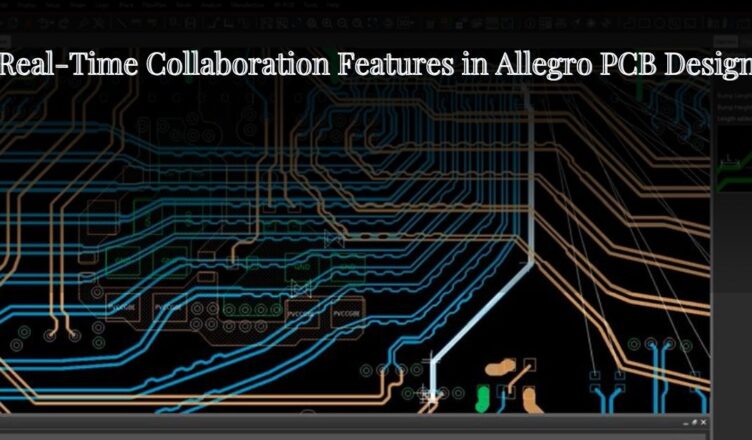In the fast-paced world of electronics design, collaboration is key to ensuring that projects are completed efficiently and accurately. Allegro PCB Design, a leading PCB design software, offers robust real-time collaboration features that empower teams to work together seamlessly, no matter where they are located. This article explores the real-time collaboration features in Allegro PCB Design, highlighting how they enhance productivity, streamline workflows, and ensure the accuracy of PCB projects.
The Need for Real-Time Collaboration in PCB Design
As PCB designs become increasingly complex, the need for effective collaboration among team members grows. Designers, engineers, and stakeholders must be able to communicate and share information quickly to avoid errors, reduce time-to-market, and meet stringent quality standards. Traditional methods of collaboration, such as email and file-sharing, often fall short in meeting these needs, leading to miscommunications and delays. Real-time collaboration tools integrated within PCB design software provide a solution to these challenges, enabling teams to work more cohesively and efficiently.
Key Real-Time Collaboration Features in Allegro PCB Design
Allegro PCB Design offers a suite of real-time collaboration features designed to facilitate seamless teamwork and improve overall design efficiency. These features include:
- Simultaneous Editing One of the standout features of Allegro PCB Design is simultaneous editing, which allows multiple team members to work on the same design file at the same time. This capability ensures that changes are reflected in real-time, preventing the confusion and errors that can arise from working on outdated versions of a design. Simultaneous editing fosters a more integrated workflow, where designers and engineers can instantly see and respond to each other’s modifications.
- Integrated Communication Tools Allegro PCB Design includes built-in communication tools that enable team members to discuss design changes and provide feedback directly within the software. This integration of communication tools eliminates the need to switch between different applications, saving time and reducing the risk of miscommunication. Team members can leave comments, tag specific components or areas of the design, and track conversations, ensuring that all feedback is captured and addressed.
- Version Control Effective version control is crucial for managing complex PCB projects. Allegro PCB Design’s version control features allow teams to keep track of all changes made to a design, including who made the changes and when. This feature helps prevent conflicts and ensures that all team members are working with the most up-to-date version of the design. Additionally, it allows for easy rollback to previous versions if needed, providing a safety net in case of errors.
- Design Reviews and Approval Workflows Allegro PCB Design streamlines the design review and approval process by providing tools for conducting real-time design reviews. Team members can collaborate on design reviews, mark up designs, and track approvals within the software. This integrated approach ensures that design reviews are thorough and that all feedback is incorporated before finalizing the design, reducing the likelihood of costly revisions later in the process.
- Cloud-Based Collaboration Allegro PCB Design supports cloud-based collaboration, enabling team members to access design files and collaborate from anywhere with an internet connection. This flexibility is particularly beneficial for distributed teams and remote work scenarios. Cloud-based collaboration ensures that all team members have access to the latest design files and can contribute to the project in real-time, regardless of their physical location.
- Design Data Management Managing design data is a critical aspect of PCB design. Allegro PCB Design offers robust design data management features that ensure all design data is organized, accessible, and secure. Teams can manage libraries, BOMs, and other design data collaboratively, ensuring consistency and reducing the risk of errors. Centralized data management also simplifies the process of sharing design data with external partners and stakeholders. Additionally, leveraging PCB design services can further enhance the efficiency and accuracy of managing design data throughout the project lifecycle.
Benefits of Real-Time Collaboration in Allegro PCB Design
The real-time collaboration features in Allegro PCB Design offer several key benefits:
- Increased Productivity: Real-time collaboration eliminates delays caused by miscommunication and the need to merge different versions of design files, enabling teams to work more efficiently.
- Enhanced Accuracy: By providing a single source of truth and enabling immediate feedback, real-time collaboration reduces the risk of errors and ensures that designs meet quality standards.
- Improved Flexibility: Cloud-based collaboration and integrated communication tools provide the flexibility needed for modern, distributed teams to work effectively.
- Streamlined Workflows: Integrated design reviews, approval workflows, and version control simplify the design process, making it easier to manage complex projects.
Conclusion
Real-time collaboration features in Allegro PCB Design are transforming the way teams work together on PCB projects. By enabling simultaneous editing, integrating communication tools, providing robust version control, and supporting cloud-based collaboration, Allegro PCB Design enhances productivity, accuracy, and flexibility. These features ensure that teams can collaborate effectively, streamline their workflows, and deliver high-quality PCB designs on time and within budget. PCB layout services can further optimize the design process, ensuring the most efficient and effective use of Allegro’s capabilities. As the demands of PCB design continue to grow, the real-time collaboration capabilities of Allegro PCB Design will remain an invaluable asset for design teams worldwide.

